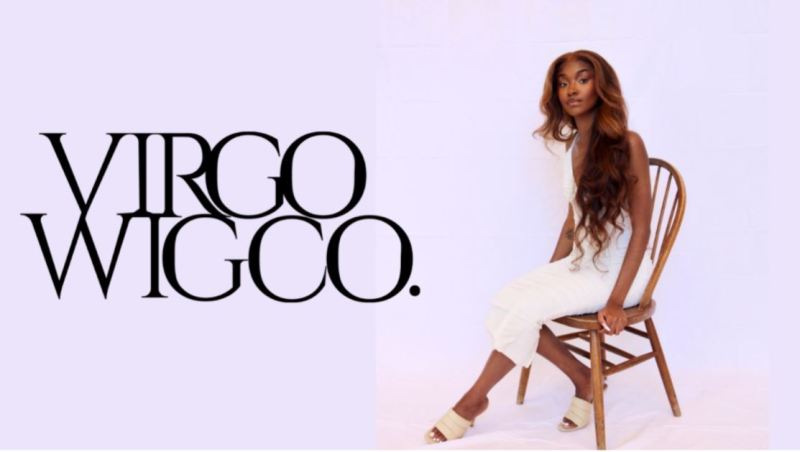As a dancer and Institute for Diversity in Arts (IDA) fellow, Linda Denson ’23 is no stranger to artistic endeavors — and Virgo Wig Co. (VWC) shows us their passion for hair as art.
Denson’s journey with artistry began in high school, but quarantine accelerated their involvement in the craft. Upon a shortage of hair and lace for wigs in early 2021, Denson researched the supply chain of the industry and learned of the existing labor exploitation. Denson stopped buying wigs, citing related ethical concerns.
Denson created VWC to “establish a sort of transparent and ethical way company that respects the artistry and the fervor that Black women have brought to the wig industry,” they said.
They began by customizing and styling wigs they already owned, eventually figuring out how to make six styles from just one wig. Soon, they began to share their journey and tips through Tik Tok and Youtube.
As Denson’s skills grew, they set out to create their own wig from start to finish, ultimately developing VWC’s first product. Denson, a fan of astrology and a Virgo sun, decided on the name because they wanted to be represented in the company title without explicitly using their name. The first collection of VWC, Sun Sign, will feature wigs based on the energy of each star sign.
Denson was motivated to start VWC to prevent commercial exploitation in addition to labor exploitation. They said that wigs are mostly marketed towards Black women, which makes them feel like they need to use foreign hair to feel beautiful.
By founding VWC, Denson hopes to change this culture by encouraging the use of “wigs less as a way of masking one’s natural beauty and more as a way of expressing yourself in a different way as an art.”
VWC offers made-to-order, custom and ready-to-ship units made from raw, unprocessed Indian hair. The wigs are personally constructed by Denson to fit the vision of the customer. In the current Sun Sign Collection, Denson launches a wig every time the sun changes signs in order to embody the energy of each sign in their designs.
Kheshawn Wynn ‘23, the photographer for the company’s 2021 launch, got to see firsthand how Denson prioritizes empowering expression.
“I really admire Linda’s ability as a creative to create a new way for their interests to come together in their own forms of expression,” Wynn wrote in an email to the Daily. “Especially with VWC, learning about how important it was that Linda created a company that worked to respect the artistry that Black Women have brought to the wig industry was powerful to me as an aspiring creative.”
Affordability versus ethical labor was also a central debate in Denson’s mind as they founded VWC. They are a first-generation and low-income student and understood that starting a business out of pocket would be expensive, especially given the impending materials shortage. However, they knew that affordability in the wig market often comes from exploitation, and they wanted to develop products that reflect the value of ethical labor.
“One of the biggest roadblocks for me in wanting to start the business was knowing that if I did, I would have to have like a very luxury price point,” Denson said. “The price point is the way that it is because the labor practices are ethical. And unfortunately, a lot of the affordability comes hand in hand with exploitation.”
Denson announced reaching their 5-thousand-dollar milestone as a business owner in a LinkedIn post. In the post, Denson also voiced their insecurities, writing that VWC didn’t feel like a “typical” Stanford business.
“Making and selling wigs didn’t feel ‘professional’ or impressive enough for this platform. But I just made my first five thousand dollars as a business owner!” Denson wrote. “I don’t know what could be more professional than that. Today, I stop comparing myself to every other Stanford student entrepreneur and embrace my craft: I make wigs, and I’m good at it!”
Despite Denson’s initial concerns about others’ perceptions of VWC, students on campus are inspired and fascinated by Denson’s artistic efforts and commitment. Tyah-Amoy Roberts ‘23 has been supporting VWC with shoots, modeling the Scorpio wig and helping with the production of units.
“I’m always excited to see what Linda will come up with next. You can tell they put a lot of time and thought not only into the product itself but also what the products mean,” Roberts wrote in an email to the Daily.
Lee’Shae Lawson ‘23, a follower of VWC, shared a similar sentiment over Instagram direct message, writing, “It’s inspiring watching Linda grow their business! I especially love seeing how Linda styles the wigs on themselves. You can tell they put so much time and effort to ensure product quality and customer satisfaction. I’m excited to see what’s next for them and what the next new drop will be!”
Denson encouraged women of color on campus to pursue their business passions.
“If you feel like you’re good at it, and even one other person does: it’s probably worth trying,” Denson said. “I think a lot of the roadblock has to do with, ‘am I even good enough?’ No one’s certainly going to buy it if you don’t make it available for purchase.”
Denson concluded: “There’s no immediate route to success. And the worst-case scenario is that it doesn’t [work out] and you take those lessons into your next endeavor.”
